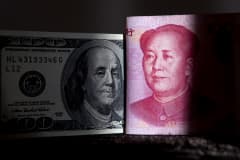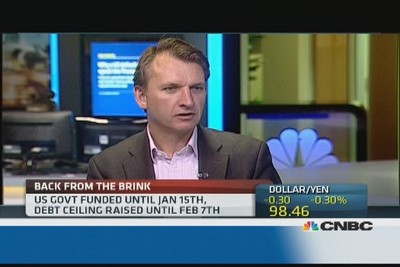Debt deal done, but dollar's demise deep-rooted
By: Matt Clinch | Assistant Producer
|
|
|

Nelson Ching | Bloomberg | Getty Images
U.S. politicians may have side-stepped a debt default at the 11th eleventh hour on Wednesday, but currency analysts have told CNBC that the dollar's status as a reserve currency will suffer long-term damage from the impasse.
"I think it's part of the demise of the dollar as an international reserve currency," Chris Watling, CEO of Longview Economics, said of the U.S. government's political impasse. Alasdair MacLeod, head of research at GoldMoney Foundation, agreed saying the dollar's credibility has taken a "very, very bad hit".
Ratings agency Fitch was equally bearish on Tuesday, indicating that the prolonged negotiations over raising the debt ceiling "risked undermining confidence in the role of the U.S. dollar as the preeminent global reserve currency" as it put the U.S. government's AAA credit rating on "rating watch negative".
Talk about the dollar's diminishing role as reserve currency has been doing the rounds for several years. Analysts have pointed to other global currencies like the Swiss franc, the Japanese yen and the Chinese yuan as potential contenders for the role. Analysts have previously indicated to CNBC if the dollar loses status as the world's most reliable currency, the United States will lose the right to print money to pay its debt and could be forced to pay this debt.
(Read More: Is the Dollar Dying? Why US Currency Is in Danger)
International Monetary Fund (IMF) statistics at the start of the year indicated that the Japanese yen, Swiss franc and what the IMF classifies as "other currencies" such as the Chinese yuan were gaining on the dollar in terms of allocated foreign exchange holdings by the world's central banks. But the trend seems to have leveled off in the latest data for the second of 2013 with the dollar constituting $3.76 trillion, or 61.9 percent, of the $6 trillion in allocated foreign exchange holdings, up from 61.5 percent at the same time last year.
But if the change is yet to be seen in the data, the rhetoric has certainly increased. With just days to go before the United States debt default deadline, Beijing aired its frustrations on Sunday with the U.S. shutdown, saying it was time to consider a "de-Americanized" world order in a stinging op-ed article by state news agency, Xinhua.
Shutdown speeds up dollar 'demise' as reserve currency: Pro
Chris Watling, CEO of Longview Economics, warns that the U.S. government shutdown has hastened the decline of the dollar as the world's reserve currency.
Watling said that the noise from China was "propaganda" but it was also a continuation of a series of moves that China has been putting in place to create an international reserve currency.
"It's cheap shots but it's indicative of a long term-trend that's ongoing," he said. China launched a currency swap deal with the euro zone last week as well as an announcement on Tuesday that it will open up its capital markets for British-based investors. In Russia last week, the ruble was been given more room by the widening of a trading band to which it can trade against a dollar-euro basket.
(Read More: Default fears put dollar's reserve status at risk)
Marshall Gittler, head of global FX strategy at IronFX told CNBC that it's likely that both Russia and China - both major holders of U.S. Treasurys - will try to diversify their reserves holdings in the future, and that is likely to dampen the strength of the dollar going forward at the margin compared to what it might have been otherwise.
"EUR and third currencies – particularly GBP and JPY – may be beneficiaries as central banks look for other liquid markets to put their money into.," he told CNBC.
But Gittler added that central banks won't be able to truly diversify away from the dollar due to the lack of alternatives, with the U.S. bond market still the most liquid, meaning dollar assets like U.S. bonds still being very attractive. The only market that approaches the U.S. in terms of size is the Japanese government bond market, he said, but a low-yielding yen meant central banks didn't hold much reserves of the Japanese currency.
(Read More: How safe is your money if the US defaults?)
"The low share of yen in central banks' reserves is an important signal for just what it is that makes a reserve currency," he said. "This suggests to me that it will be a long time before the yuan occupies a substantial share of the world's FX reserves. The search for alternative to the dollar as the lynchpin of the global financial system is likely to continue and indeed to accelerate after this appalling demonstration of mismanagement, but so far no one has come up with any better ideas."
— CNBC.com's Matt Clinch. Follow him on Twitter
@mattclinch81

No comments:
Post a Comment